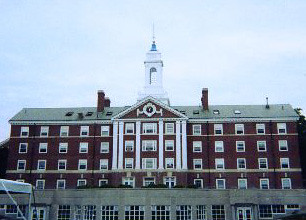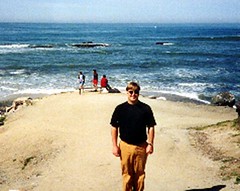
[My shared bedroom , in this triple, was on the second floor just to the right of the pointy entryway and our living room behind the two jutting out windows]
freshman year. I moved to North House and the Radcliffe quad for sophomore through

[I lived in a single on the back T wing of Moors as a sophomore].
senior year. While at Harvard, my main musical activity involved writing the odd album review for The Harvard Independent. As a senior, I was lucky enough to be awarded a Rotary Post-Graduate Fellowship for MA study at the University of York. There I began my radio career at Britain's oldest legally independent radio station, URY.
Mission of Burma, "That's How I Escaped My Certain Fate"
This essay in a slightly longer form will appear eventually on Stylus's Perfect Moments in Pop column.
While exploring Boston and environs my freshman year, I noticed some maniac had tagged anything tied down and even some MBTA rolling stock with "Mission of Burma." I assumed this was some kind of protest against General Ne Win and the BSPP. Then on WFNX, I heard Mission of Burma's "That's When I Reach For My Revolver" and everything changed. For the next two years, when time and money allowed I caught the all ages shows of Burm,a including the glorious "final" afternoon gig at the Bradford Hotel. My favorite song by this band was the one I always referred to as the other "That's" song. And on many a day I deemed it the better "That's" song.
Here's what Roger Miller says about "That's How I Escaped My Certain Fate" on the Burma website:
Pure Punk Power Pop. For Vs., the tape ran out before the end was over. We decided we liked that. In the mix, we opted for overdriving the living hell out of the vocals and guitar track in the board. Some thought this was a bit extreme at the time.That snap, crackle, pop ending is indeed one of the song's highlights. The new iTunes-only Snapshot ep, easily one of the two or three best items of the year, is, as Douglas Wolk wrote in The Seattle Weekly, the sound of "the sky being torn open. . . . that amazing noise." Its version of "That's How I Escaped My Certain Fate" has Miller again invoking the title twice, interrupted only by a knowledgeable in-studio fan excitedly gasping "Yeh" and a guitar flourish, and then it's off to the races for 2:13 of Clint Conley's hollered lyrics and walking bass lines, Peter Prescott's brutally metronomicdrumming, Martin Swope's tape loops, and Roger Millers smeary guitar brilliance. It is "the sound that American indie bands have been tinkering with ever since" as Rolling Stone's Rob Sheffield once noted.
Miles Davis, A Tribute To Jack Johnson
I have been into jazz for quite a while, but it really helped to have a jazz-rock crossover record to get me listening more seriously. I owe this record to Robert Christgau, as I bought it after reading his review of it in the old white with blue and green highlights 1970s Consumer Record Guide I leafed through regularly on my visits to the Harvard Coop's record department back in 1981-5, when it was the best record store in New England not called Newbury Comics. It also puts me in mind of a phenomenon gone with the CD and the art of programming cuts away. I used to measure the greatness of records in terms of the basic unit, a complete side. Could I listen to one side of a vinyl platter without getting up and wanting to skip a song? If so, they became candidates for the higher honor, a "typing" and post-10/84 "word processing" record. I'd stack favorites including side 1 of Jack Johnson, side 2 of Greetings from Asbury Park, New Jersey, and (rarest of all) either side of Purple Rain or any of the four sides of London Calling whenever I had a paper to type from my longhand written pages. The first year I had my IBM PC 512K monster I still composed off-line. To this day, I still prefer this album to the more famous double, Bitches Brew, primarily because it rocks harder and steadier.
The Clash, The Clash (US)
Sure the UK original has a more interesting and rawer sound, but I heard this version first, and it includes my second favorite single of all time "White Man in the Hammersmith Palais." I lived in Freiburg, West Germany during the summer of 1977, which was a lot closer to London and the center of he punk universe than Tallahassee but still a world away from gobbing, pogoing, and safety pins as fashion statement. I retained an interest in studying and listening to punk rock until spring semester of my senior year, when I took a course on Post-World War II Britain and wrote a paper about the politics of punk rock, looking at The Sex Pistols, The Clash, and The Jam. I spent spring break that year in London, including several days at the National Sound Archives on Exhibition Road sandwiched between Imperial College London and the Science Museum. A feature element of the paper was this analysis of "White Man at the Hammersmith Palais":
In their best single, "White Man at the Hammersmith Palais," the Clash turn a critical eye on modern British society from a youth's perspective. The inequality is noted, as "White youth, black youth, better find another solution / Better phone up Robin Hood and ask him for some wealth distribution." Similalrly their own movement per se gets its: "Punk rockers in the U.K., they won't notice anyway / They're too busy fighting for a good place under the lighting." Finally the tawdry sham of consumerism becomes a symbol of English society: "All over people changing votes along with their overcoats." It is important to add that this phrase coincides witht he musical climax of the piece.And you thought I never paid attention to lyrics!
That paper concluded by noting the importance of "Style" to all three bands under consideration. It drew the following generalizing conclusion:
They were young, without history, seeking to replace a stale orthodoxy of lumbering guitars and rockers as artistes. Yet among themselves there was great diversity of musical style and even political beliefs. The sole common denominator was an attempt to question the validity of the establishment. In their quest, these bands became the icons of the age, indelibly stamped in the consciousness of Britain's youth, whether or not they accepted their musical challenge.
The Smiths, Hatful of Hollow
In Cambridge, MA, my introduction to music videos was by way of the independet VHF station V 66 "Solid in Sommervile," which competed with MTV's commercial dominance by running all the obscure indie videos they could find to fill screen time, including basically every early Black and White arty, NHS glass sportin', fake hearing aid wearing video by this British band called The Smiths. Needless to say they caught my attention. On most days, this not Queen is my favorite Smiths' "album"; yes I realize it's a compilation more than a true album, but so what. I still get chills everytime I hear the opening tremolo effect of "How Soon is Now?"
Sam Cooke, Live at the Harlem Square Club
As the first post in this series ("In my room.") made clear, I have a passion for classic soul music of the late 60s and early 1970s, something which for much of my life I've kept to myself. The first time I let my interest out publicly was perhaps the first really good record review I ever wrote: about the 25-year delayed release of this disc for the 1985 summer version of the Harvard Independent. I had done a nice hatchet job on Bob Dylan's Infidels as my first music review for them in late 1983.
This record is a revelation because we hear Cooke performing on the chitlin' circuit in Miami before an all-black audience and none of the Nat "King" Cole "white" crooning is present in his voice, which instead emanates a feral sexuality (you can hear women swooning in the front row throughout the concert). Along with James Brown's two Live at the Apollo records and Solomon Burke's Soul Alive, Live at the Harlem Square Club is a testament to just how strong soul music can be.
The Wedding Present, George Best
The Jesus and Mary Chain, Psychocandy
The Pogues, Rum, Sodomy & The Lash
The Redskins, Neither Washington Nor Moscow
The 1985-1986 academic year was in many ways a musical annus mirabilis. I first heard The Queen is Dead, the Housemartins, Hüsker Dü on a major label, the Shop Assistants, the Woodentops, and Scritti Politti to name but a few bands and records. However, the four records listed above were the cream of this crop as I began my radio career. I really first heard the Wedding Present on their second Reception 7" "Once More," but waited for the debut album to arrive as my first purchase. David Gedge's angst-ridden lyrics of unrequited or lost love coupled with the blitzoid guitars spoke immeditaely to my own personal aesthetic as did the Jesus and Mary Chain's marriage of Brian Wilsonesque-melodies masked by a Phil Spector-like "wall of feedback." To this day, I maintain Psychocandy is one of the two or thee greatest debut albums of all time. What can I say about the Pogues and the bent genius of Shane MacGowan's songwriting and singing. Plus this is their first record produced by Elvis Costello and features one of their few songs with a female vocalist, Cait O'Riordan, on "A Pair of Brown Eyes" and "I'm a Man You Don't Meet Every Day." MacGowan's take on Eric Bogle's anti-war classic "And the Band Played Waltzing Matilda" is heartrending. Plus there's the Vuarnet's on The Raft of the Medusa. The Redskins "walked like the Clash and sang like the Supremes," but because they were skinheads they also got unfairly tarred with the National Front racist label. It got so bad, you couldn't even find their debut album in their hometown of York at their record label's very own Goodramgate store (Red Rhino records). They did a show on campus where I worked "security"; I doubt there was a racist skinhead within ten miles of the show, but that's how reputations run away from reality sometimes.
Next up: a decade in Northern California and a strange trip into the Deep South.

1 comment:
Ey oop!
I'm intreagued to know if you ASKED for the Redskins LP @ Red Rhino Records? I used to work there and we were careful about stocking racist / NF gear and been that The Redskins were one of our bands and we knew the score, we did sell it AND put people straight as to their NOT been racist.
I just found this via a search pon Google for ref' to Red Rhino. I'd be interested to hear any anicdotes you may have on the shop or releases on labels from our Distributor side. I'm working on putting something together for a York-centric music history site.
Cheers
Mossey from www.electroempire.com
Post a Comment